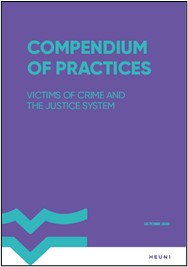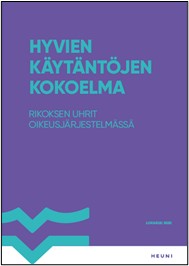In 2012, the Directive 2012/29/EU of the European Parliament and of the Council of 25 October 2012 establishing minimum standards on the rights, support and protection of victims of crime Union – the socalled Victims’ Rights Directive -, that created a fundamental legal framework for the protection of victims in the European, was adopted. Victims and their needs are central to criminal justice and the decisionmaking process of various authorities and organizations. In order to exercise their rights victims must be given appropriate legal support by the competent national stakeholders. Applying a victim-centered approach entails that legal support must be tailored to victims’ needs and characteristics.
This publication presents a collection of best/promising practices to support victims in Bulgaria, Finland, Germany, Romania and Spain. Certain practices refer to all victims of crime, while others relate to certain types of victims. The practices were collected for the whole spectrum of the criminal proceedings: investigation, prosecution, court.
Information on the practices was obtained through desktop research (analyze of legislation, jurisprudence, strategies and programmes), questions addressed to institutions and organizations that have competences in the justice system, in the protection of victims’ rights (ministries, courts, prosecutors’ offices, governmental agencies, law enforcement agencies, NGOs etc.)
The term “practice” is used lato sensu including programmes, strategies, services successfully implemented in the project countries (Bulgaria, Finland, Germany, Romania and Spain). Sharing practices can encourage further use of tested and effective methods, they can serve as example for similar approaches that could be developed and implemented at local, national and European level by institutions and organizations that have competences in the protection of victims’ rights, access to the justice system, delivery of assistance services. Efforts to protect the rights of victims of crime must be included in the measures taken at local, regional, national and European level from the moment the victim is identified until the end of the criminal trial procedures. There is always a need for a unified, coordinated response from stakeholders to victims who are injured parties in the criminal proceedings.
Euroopan parlamentin ja neuvoston 25 päivänä lokakuuta 2012 rikoksen uhrien oikeuksia, tukea ja suojelua koskevista vähimmäisvaatimuksista antama direktiivi 2012/29/EU eli Uhridirektiivi astui voimaan vuonna 2012 ja loi perusteet rikosten uhrien suojelemiselle Euroopan unionissa. Uhreilla ja heidän tarpeillaan on keskeinen asema rikosoikeudessa sekä useiden viranomaisten ja organisaatioiden päätöksenteossa. Uhrit tarvitsevat asianmukaista oikeudellista tukea toimivaltaisilta kansallisilta tahoilta voidakseen käyttää oikeuksiaan. Uhrikeskeisen lähestymistavan soveltaminen edellyttää uhrin tarpeisiin ja ominaisuuksiin mukautettua oikeudellista tukea. Tässä julkaisussa esitetään eräitä Bulgariassa, Suomessa, Saksassa, Romaniassa ja Espanjassa käytössä olevia parhaita ja lupaavia käytäntöjä uhrien tukemiseen. Jotkut käytännöt koskevat kaikkia rikoksen uhreja, kun taas toiset koskevat vain tietyntyyppisiä uhreja. Käytäntöjä on kerätty kaikista rikosprosessin vaiheista niin tutkijoilta, syyttäjiltä kuin tuomioistuimiltakin. Tietoa käytännöistä kerättiin kirjallisuuskatsauksella (lainsäädännön, lakitieteen, strategioiden ja ohjelmien analysointi) sekä haastattelemalla oikeudellisia toimijoita ja organisaatioita, joilla on uhrien oikeuksiin liittyviä toimivaltuuksia (ministeriöt, tuomioistuimet, syyttäjänvirastot, valtion virastot, lainvalvontaviranomaiset, kansalaisjärjestöt jne.).
”Käytännön” käsitettä käytetään laajassa merkityksessä kuvaamaan esimerkiksi hankevaltioissa (Bulgaria, Suomi, Saksa, Romania ja Espanja) onnistuneesti toteutettuja ohjelmia, strategioita ja palveluita. Käytäntöjen jakaminen voi edistää testattujen ja tehokkaiden menetelmien laajempaa käyttöä. Muiden maiden käytännöt voivat lisäksi tarjota esimerkkejä paikallisista, kansallisista ja Euroopan laajuisista lähestymistavoista, joita uhrien oikeuksien turvaamisesta, oikeussuojakeinojen saatavuudesta ja tukipalvelujen tuotannosta vastaavat viranomaiset ja organisaatiot voivat kehittää ja toteuttaa omilla oikeudenkäyttöalueillaan.
Rikoksen uhrien oikeudet on turvattava kaikissa paikallisissa, alueel l isissa, kansal l isissa ja eurooppalaisissa toimenpiteissä uhrin tunnistamisesta aina rikosoikeudenkäynnin loppuun asti. Rikosoikeudellisessa prosessissa asianomistajan asemassa olevat uhrit tarvitsevat kaikissa tilanteissa yhtenäistä ja koordinoitua tukea viranomaisilta ja muilta prosessiin liittyviltä toimijoilta.


